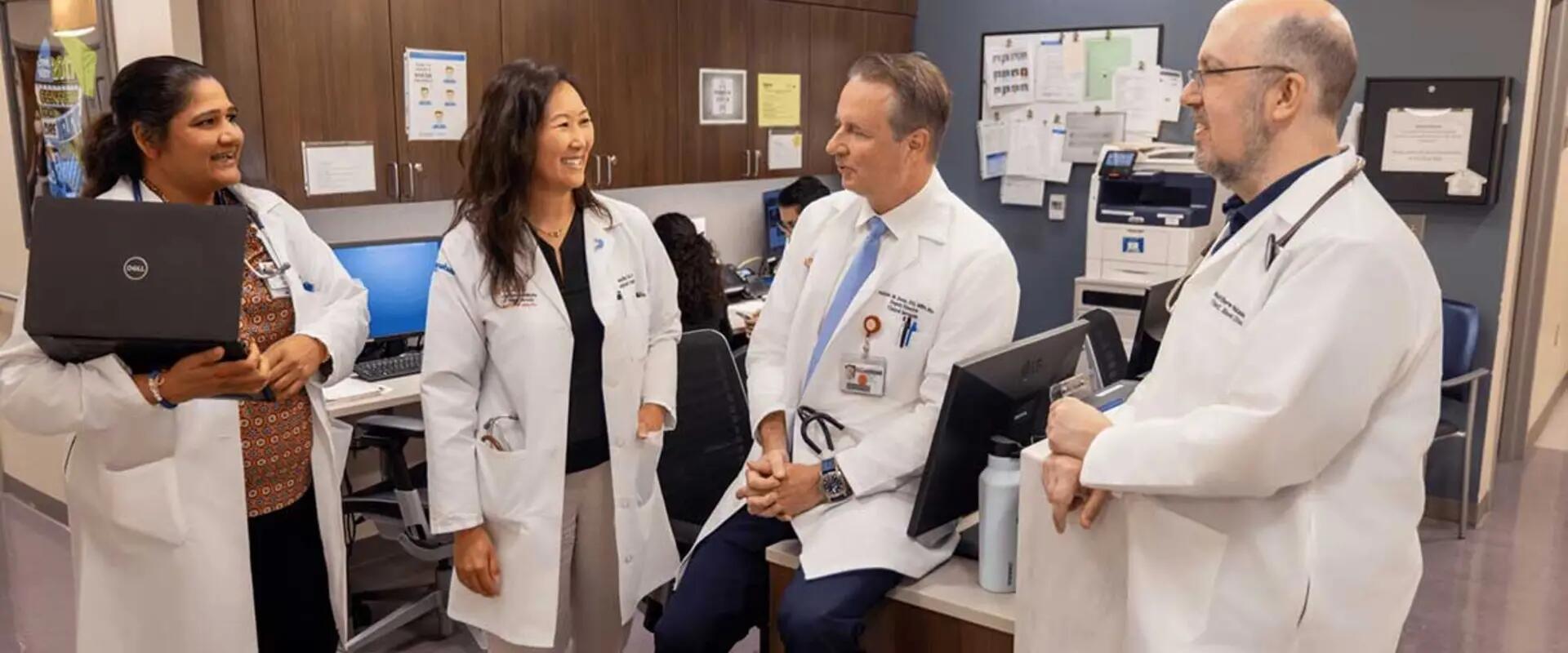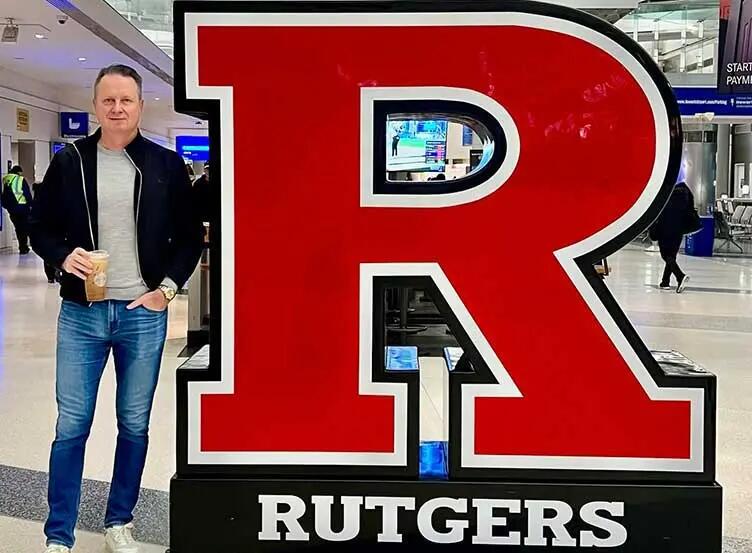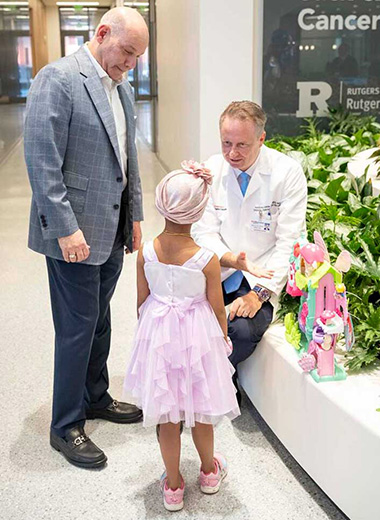
Dr. Andrew Evens (center) speaks with colleagues in the Hematologic Malignancies Clinic at the Rutgers Cancer Institute/Jack & Sheryl Morris Cancer Center.
How an Executive MBA fuels a doctor's ability to lead and innovate in cancer care and healthcare management
Dr. Andrew Evens completed the Rutgers Executive MBA Program in 2022. He serves as deputy director for clinical services and chief physician officer at the Rutgers Cancer Institute and Jack & Sheryl Morris Cancer Center, the state’s only freestanding comprehensive cancer hospital. He is also the system director of medical oncology at RWJBarnabas Health and oncology lead for the RWJBarnabas Health Medical Group. In the Q&A below, he describes the skills that helped him to transition from a practicing physician and researcher to positions of management and leadership within healthcare. He also explains how he has leveraged knowledge and connections from his time in the Executive MBA program to help advance cancer care.
Where were you in your career when you decided to pursue an Executive MBA?
Upon arriving at Rutgers University and RWJBarnabas Health in 2018, I was exposed to more expansive leadership opportunities vis-à-vis a robust, expansive, and dynamic oncology service line that spans the entire state of New Jersey. I had an opportunity to be more involved with business development, financial, and entrepreneurial opportunities, which I greatly enjoyed. I was at a point in my career in 2019 where I had been a practicing oncologist and academic physician-scientist for just over 15 years. During that time, I maintained a busy clinical practice and had many associated research endeavors dedicated to the field of lymphoma, which garnered a national and international reputation. This included running a translational lymphoma research laboratory that had been continuously funded by the National Institute of Health (NIH) for many years. In addition, I had held several division and department leadership positions but was now ready to partake in a higher level of leadership impacting decisions across the service line. As I shifted my time to more senior positions, I decided I needed to sunset my laboratory work and obtain additional skills for advanced business management in the healthcare field through the Executive MBA program.
What was the highlight of your Rutgers EMBA experience?
The highlight of my experience was undoubtedly the networking and people, which includes all of my amazing classmates. We had a fantastic EMBA Class of 2022 that spanned all fields and specialties. In particular, I was quite happy to have a great core “small group” of colleagues who were ambitious, bright, and collaborative. This included James Guy, Brant Leyden, Andrew Whitten, Chris Chester, and Nichole Jeanpierre-Platt – all incredibly successful leaders in their respective companies and fields.
Learn more about the Rutgers Executive MBA Program and what it offers. Attend an Open House on Saturday, Oct. 4 or Sunday, Nov. 2, at Rutgers Business School in Newark. Both events begin at 8:30 a.m.
What professor or class made the greatest impact on you and why?
It's difficult to choose one professor or class. I enjoyed Finance for the C-suite, Financial Strategy, Financial Statement Analysis, Economics, Mergers and Restructuring, and classes in supply chain. Another impactful class was Business Strategy as taught by Professor Jerry Kim. It was fascinating to see the various types of business strategies and principles that may be applied across different sectors of the workplace and workforce. The statistical classes led by Professor Rosa Oppenheim were enlightening and highly informative and provided me with skills I have subsequently applied to a major project that I am the co-founding principal investigator of a global cancer consortium called HoLISTIC (Hodgkin Lymphoma International Study for Individual Care). We created a unique collaboration among top Hodgkin Lymphoma (HL) experts throughout the world as well as top cancer epidemiologists, decision-making and imaging experts, statisticians, and key patient advocacy groups. Through this construct, which is externally funded by the NIH on a large federal R01 grant, we established a harmonized database of more than 30,000 HL cases with individual patient data. The database is being harnessed to create multi-state models to estimate transition probabilities for short- and long-term outcomes for HL patients of all ages. The results are being incorporated into ‘open source’ web-based simulation models that will guide patients and providers on treatment options best aligned with individual patient values and preferences.

How have you applied what you learned during the program to your work?
There have been many applications from the EMBA to my current clinical leadership roles. These include more rigorous and dynamic financial management, a deeper understanding of national and global economics as well as the critical components of supply chain. The pandemic occurred during my first year in the EMBA program, and being in the healthcare sector, the learnings from supply chain were relevant and timely. After the EMBA was completed, I pursued a collaborative opportunity with Professor Kim, Rutgers Business School and RWJBarnabas Health where we examined the varied components associated with “in system utilization,” which involved detailed qualitative and quantitative analyses across the oncology service line.
I also was introduced to Professor Xin (David) Ding in the Supply Chain Management Department for another intersecting collaboration between Rutgers Business School and RWJBarnabas Health. We sought to improve the efficiency of a busy and complex ambulatory hematology/oncology practice for blood cancers to address the patient’s daily care journey, including bone marrow transplantation, CAR T-cell therapy, and other novel target anti-cancer treatments. Over a two-year period, which included the participation of several master’s and Ph.D. students, we utilized predictive analytics via a machine learning-based model for improved use of resources, optimized schedules, and improved overall patient experience. This was a highly productive and synergistic collaboration that created a new “fast track” prioritization system that greatly improved the efficiency for cancer patients and has led to an associated peer-reviewed manuscript that is currently in press.
How did you juggle the program with your professional responsibilities?
It was a challenge to juggle the program with professional responsibilities, and as noted, I did the program during the start of the COVID pandemic. However, Rutgers Business School was dynamic and accommodating to the learners. There was a rapid transition to remote learning and hybrid components thereafter.
Can you tell us about the promotions you have received since starting the Executive MBA Program?
It was an honor to receive three promotions, in part, because of the Rutgers Executive MBA. During the program in 2021, I was appointed associate vice chancellor for clinical innovation and data analytics at Rutgers Health. Working with the senior vice chancellor at Rutgers Health, I provided leadership on innovation, data analytics, and evidence-based decision-making support systems. We advanced evidence-based practices to create innovative and automated feedback loops for implementation to promote robust, dynamic, and high-value clinical decision analysis and support. A second promotion during the program was being named “oncology lead” for the RWJBarnabas Health Medical Group. Working directly with the CEO and president of the RWJBarnabas Health Medical Group, I helped to lead the recruitment of outstanding oncology providers and physician experts for the multitude of RWJBarnabas Health oncology ambulatory clinics and practices and the 14 acute care hospitals across New Jersey. A third exciting promotion occurred in 2024 when I was named the deputy director for clinical services and the chief physician officer at the Rutgers Cancer Institute and the Jack & Sheryl Morris Cancer Center.
Describe the day-to-day responsibilities in your new role.
As the deputy director for clinical services at the Rutgers Cancer Institute, which is the only NCI-designated Comprehensive Cancer Center in New Jersey, I work on a wide variety of executive duties and initiatives with the director and senior vice president for oncology services. This includes leadership and oversight for the clinical enterprise, supervising and working closely with physician leaders (i.e., department chairs and division chiefs) across all specialties and clinical care sites, administrative vice presidents, and other directors and leaders in quality, nursing, patient experience, clinical operations, and practice management.

I also assist with the strategic planning for oncology clinical services across RWJBarnabas Health and the 14-hospital, multi-practice oncology service line throughout New Jersey. In the role of deputy director for clinical services, I serve as the chief physician officer for the new Jack & Sheryl Morris Cancer Center. The chief physician officer ensures the excellence of clinical care delivery working closely with other executive leaders to coordinate productive, efficient, and high-quality cancer care services. I help lead operational efficiencies of care delivery and to optimize multidisciplinary, disease-focused care teams. I also oversee and facilitate the integration of multidisciplinary clinical programs and help guide the strategic and financial planning processes for innovative and dynamic oncology clinical services. I welcome anyone from the Rutgers EMBA family to visit me at the Jack & Sheryl Morris Cancer Center. Please send an email or give me a call at any time!
Press: For all media inquiries see our Media Kit


